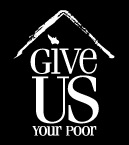Continued from previous blog...
I wonder too what will happen in January and February, in March or May or July - when the impetus of good cheer fades and the need does not. Homelessness is not seasonal; and in fact the summer months often see a rise in the number of families with no place to live. The reality is that we cannot gather enough clothes and food and toys and household items to really turn the tide; those things may sustain for a bit, but lives cannot really improve if there are no jobs, no health care and no places to live.
But even beyond that there is one aspect of homelessness and poverty that is usually overlooked, one aspect that may in many ways inform these other vital needs. What others often don’t realize is the simple fact of just how lonely a place poverty is.
Studies have shown that familiarity with others – be they of a different ethnicity, religious belief, race or economic status – is a key factor in reducing prejudice and improving collaboration and understanding. So long as the poor are ‘out there,’ so long as the giving is not face to face, it is hard to understand, support and enact the kind of underlying changes that are needed to make a lasting difference because one can remain apart, one can see this as an act of charity and not humanity.
Human interaction is an essential part of any life; it is precious, it is empowering, it gives us a sense of meaning, of worth. To be ignored, to be invisible is to be meaningless; yet this is what poverty does for it is brutally lonely.
The homeless cannot have you over to their house – they have no house. The poor cannot go out to dinner they do not have the money, they cannot meet their friends for coffee and chat about the struggles and joys of raising children for there is no place to meet, they cannot hang out to watch the game on TV with their pals for they have no TV and they have no pals. They do not go to museums or book clubs or the movies. They do not have a community for even when they try to form one it will change; these are the vicissitudes of their circumstance.
The poor lack the entryway to one of life’s most basic pleasures; that of camaraderie, of companionship. When you have no income and no place to live your life gets small and direct; every day is about surviving that day, about managing the crisis you are facing now, about shelter and food and holding on Not having an income doesn’t mean more leisure time; it means no leisure time.
To be poor means that your dreams are reduced to the smallest possible existence, that you learn to keep your own company, head low, barely noticed; its better that way. You keep your feelings to yourself even as you hunger not only for a meal but equally for something that you cannot find in the food pantry; a voice to answer yours, a conversation, a human touch. Relationships, time with others, the art of sharing, a hug to ease ones fears; these moments buoy the spirit and give hope, they heal and nurture but the truth is that they are absent for the poor. For them poverty is only heartbreakingly lonely.
So this is what I hope – I hope that after this holiday season passes by we do not give up, we do not think we are done, that the gap has been filled. I hope that we will keep our awareness alive, that we will keep making our material contributions, even if they don’t seem to fill the vast space of need.
But beyond that I also hope that we see people who are homeless, who are poor, who are in need as people, that we learn to cross our paths with them, to talk with them, to employ them, to break bread with them, to even make them our friends. I hope that we find a way to give of ourselves, to embrace those who are without so that we can truly recognize these folks as people and perhaps change the course of their lives and the course of our own.
Ms. Sayko is a senior manager in health care who also works to improve conditions for those who struggle with illness, injury, poverty and homelessness.
The photo, "Hope for the Holidays," by ewitsoe is used with permission.
Tuesday, December 28, 2010
The Gift (Part 2) by Madelaine Sayko
Labels:
Charity,
Economic Crisis,
Giving,
homeless,
homelessness,
Madelaine Sayko,
New York,
Sustainability
Subscribe to:
Post Comments (Atom)



No comments:
Post a Comment